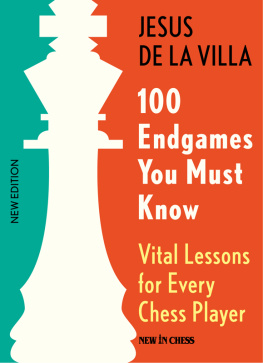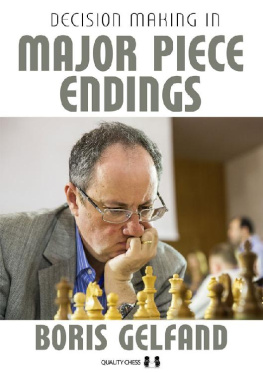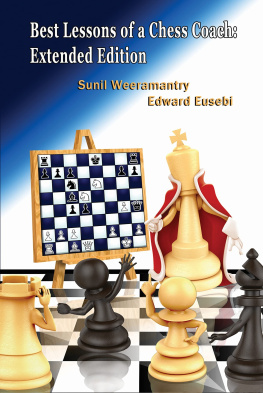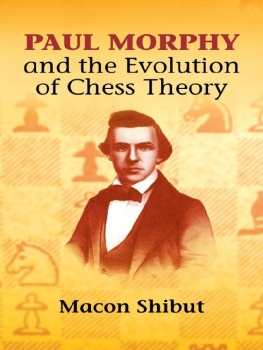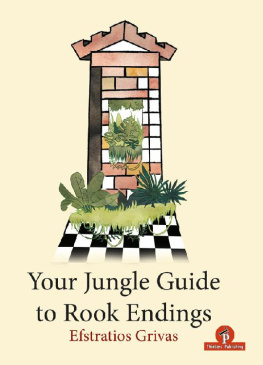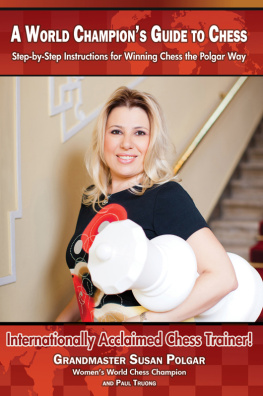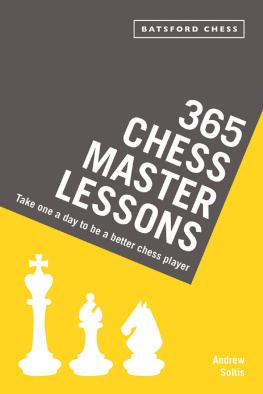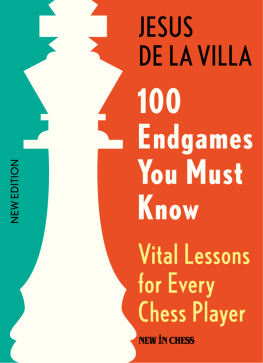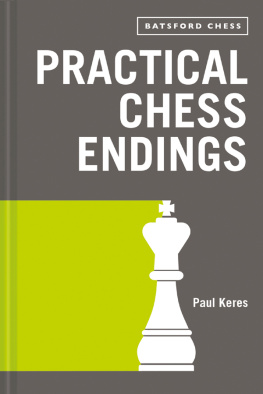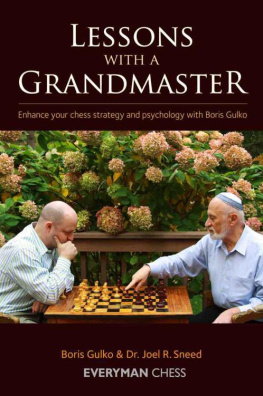Jesus de La Villa - 100 Endgames You Must Know: Vital Lessons for Every Chess Player Improved and Expanded
Here you can read online Jesus de La Villa - 100 Endgames You Must Know: Vital Lessons for Every Chess Player Improved and Expanded full text of the book (entire story) in english for free. Download pdf and epub, get meaning, cover and reviews about this ebook. year: 2015, publisher: New In Chess, genre: Children. Description of the work, (preface) as well as reviews are available. Best literature library LitArk.com created for fans of good reading and offers a wide selection of genres:
Romance novel
Science fiction
Adventure
Detective
Science
History
Home and family
Prose
Art
Politics
Computer
Non-fiction
Religion
Business
Children
Humor
Choose a favorite category and find really read worthwhile books. Enjoy immersion in the world of imagination, feel the emotions of the characters or learn something new for yourself, make an fascinating discovery.
- Book:100 Endgames You Must Know: Vital Lessons for Every Chess Player Improved and Expanded
- Author:
- Publisher:New In Chess
- Genre:
- Year:2015
- Rating:4 / 5
- Favourites:Add to favourites
- Your mark:
- 80
- 1
- 2
- 3
- 4
- 5
100 Endgames You Must Know: Vital Lessons for Every Chess Player Improved and Expanded: summary, description and annotation
We offer to read an annotation, description, summary or preface (depends on what the author of the book "100 Endgames You Must Know: Vital Lessons for Every Chess Player Improved and Expanded" wrote himself). If you haven't found the necessary information about the book — write in the comments, we will try to find it.
Jesus de La Villa: author's other books
Who wrote 100 Endgames You Must Know: Vital Lessons for Every Chess Player Improved and Expanded? Find out the surname, the name of the author of the book and a list of all author's works by series.
100 Endgames You Must Know: Vital Lessons for Every Chess Player Improved and Expanded — read online for free the complete book (whole text) full work
Below is the text of the book, divided by pages. System saving the place of the last page read, allows you to conveniently read the book "100 Endgames You Must Know: Vital Lessons for Every Chess Player Improved and Expanded" online for free, without having to search again every time where you left off. Put a bookmark, and you can go to the page where you finished reading at any time.
Font size:
Interval:
Bookmark:
100 Endgames You Must Know
Shortlisted for The Guardian Chess Book of the Year Award
[Former Womens World Chess Champion Alexandra Kosteniuk] said she had really enjoyed De la Villas 100 Endgames You Must Know and had made flashcards out of the 100 positions. One side of the card had the position, the solution was written out on the reverse, and she quizzed herself until she knew all 100.
Elisabeth Vicary, USCF Online
If you really have no patience for endgames, at least read Jesus de la Villas 100 Endgames You Must Know.
Gary Walters Chess
The greatest strength of the book: breaking things down into well-worded chunks of easily digestible information.
Marsh Towers Chess Reviews
De la Villa does the job quite well. He emphasizes the practical and prefers understanding to memorization.
IM John Donaldson, jeremysilman.com
(comparing 100 Endgames with John Nunns Understanding Endgames) Though Nunns comments are clear and to the point, I found De la Villas discussions easier to digest.
Ted Greiner, British Correspondence Chess Association
Admirable
Justin Horton, Kingpin Magazine
A clear exposition of the most imortant endgames, with exercises to test your knowledge.
British Chess Magazine
The instructional explanations, the many diagrams and the pleasant presentation make this endgame book an interesting publication for club players with a rating from 1600.
Max Euwe Centre, Amsterdam
An excellent book to enhance your endgame skills.
Johan Hut, Gooi- en Eemlander
Every club player should study this splendid book.
B.H.Wilders, Nederlands Dagblad
We all admired 100 Endgames for its clarity and practical value.
Danny King & Ronan Bennett, The Guardian
I like it a lot. It may be the first chess book since more than 25 years I will study thoroughly.
WIM Rike Wohlers-Armas
Jess de la Villa
100 Endgames You Must Know
Vital Lessons for Every Chess Player
Fourth, Improved Edition
New In Chess 2015
New In Chess
First Edition May 2008
Second Edition August 2009
Third, Improved and Extended Edition November 2012
Fourth, Improved Edition September 2015
Published by New In Chess, Alkmaar, The Netherlands
www.newinchess.com
All rights reserved. No part of this book may be reproduced, stored in a retrieval system or transmitted in any form or by any means, electronic, mechanical, photocopying, recording or otherwise, without the prior written permission from the publisher.
Cover design: Ron van Roon
Translation: Patricia Llaneza Vega
Correction: Steve Giddins
Supervisor: Peter Boel
Proofreading: Ren Olthof
Production: Anton Schermer
ISBN: 978-90-5691-617-6
Introduction
The relative importance of the endgame
In my first years in the world of chess, I used to read a lot about the importance of a good knowledge of endgames and the futility of studying openings. I used to find this kind of statement not only in Capablancas works, but also in many articles from magazines of that time: sentences like Grandmasters greater understanding is most clearly noticeable in the endgame and similar things. Strategy used to receive the same, or similar, treatment when compared to tactics. You could read sentences like Grandmasters spend much more time in developing plans rather than in calculating variations and so forth. That could be the reason why I, who spent almost my whole time during the games in calculating variations accurately, and devoted much more time to the study of openings rather than the endgame, could not even imagine that I would one day become a grandmaster.
It took me a long time to discover that all those recommendations were fairly exaggerated, but perhaps I should be grateful to them, as I do not know whether, otherwise, I would have paid to the endgame the attention this stage of the game truly deserves. My concern about those statements by famous players led me to devote some time to the study of the endgame, which eventually I enjoyed.
It is true, however, that it was not easy. One of my first decisions, a rather drastic one, actually, was to buy Rook Endings, by Levenfish & Smyslov, a book as excellent as it is boring. I had to start reading it several times, as I found it extremely difficult to get beyond the first one or two chapters. Nevertheless, in the end I managed to absorb some of the material.
Recently, the openings have taken over as overwhelmingly the main area of chess study. All great players spend most of their time researching new variations, in order to surprise their opponents and obtain as large an advantage (or as small a disadvantage) as possible, before the game itself really begins. But do not be fooled: it is not that these players have discovered that there is no value in studying the endgame, merely that they have already done their homework and at least have a good command of the most important endings. Of course, there are some distinguished exceptions, as you can see now and then in a few of the games and examples in this book, in which top players seriously misplay basic endgames, but, generally speaking, top players have good endgame technique. The fact is that the number of important theoretical endgames, and especially those which are of practical relevance, is much smaller than the field of openings. Those top players have already paid their dues, as it were, that is, they have studied the necessary endgame material in the past, and now they can devote greater efforts to other aspects of the game, without fear of losing unnecessary half-points in the endgame, during tournaments.
Therefore, if you intend to reach a certain rating, I will not say that a good command of the endgame is essential, but it is certainly very useful. On the other hand, if you neglect this part of the game, many half points, or even full points, will now and then elude you. And you will rarely get wins in the opening to make up for those lost (half-)points, as nowadays everyone comes to their games armed to the teeth with opening preparation. To put it simply: a player who reaches a certain level as regards theory, strategy and tactics, will lose many points if his mastery of the endgame does not correspond with that same level. Thus, the study of the endgame will be the most straightforward way to improve his rating. If his mastery of the endgame is at the same level as his other skills, this effort would not be so profitable, but my experience suggests that this is not the case with most players.
Why is this? Well, any player with some years of experience, even if his rating is below 2000, knows the story: Studying the endgame is boring; Half (if not 90%) of the endings I look at are quickly forgotten; I cant find a book with good explanations; and, perhaps the smartest excuse of all, My games never reach the endgame! This is especially true of the games of players who avoid the endgame deliberately, sometimes by means of excessively risky play in the middlegame; such players often lose in the middlegame, as a direct result, although they generally explain away their defeats by blaming them on tactical blunders, or time-trouble, or some similar excuse.
This tendency to neglect the endgame has grown as the rates of play have become faster and adjournments have been eliminated. Previously, adjournments allowed deep analysis of positions (often endings) and helped players to develop their endgame technique and their appreciation of the endgame. Moreover, accurate play in endgames was possible with enough time on the clock, and those games were worth analysing, as they were fine works of art, with the study of which we could improve our overall chess understanding. Now it is rare that an ending is played with reasonable time on the clock, which leads to real comedies of errors. Consequently, the analysis of contemporary endgames is often more useful as Laughter Therapy than as a chess lesson. But precisely due to that lack of time on the clock, a good command of basic endgames is even more necessary than ever. If you are running out of time and do not have a clue about how to handle the position, the game is much more likely to end in disaster.
Next pageFont size:
Interval:
Bookmark:
Similar books «100 Endgames You Must Know: Vital Lessons for Every Chess Player Improved and Expanded»
Look at similar books to 100 Endgames You Must Know: Vital Lessons for Every Chess Player Improved and Expanded. We have selected literature similar in name and meaning in the hope of providing readers with more options to find new, interesting, not yet read works.
Discussion, reviews of the book 100 Endgames You Must Know: Vital Lessons for Every Chess Player Improved and Expanded and just readers' own opinions. Leave your comments, write what you think about the work, its meaning or the main characters. Specify what exactly you liked and what you didn't like, and why you think so.

